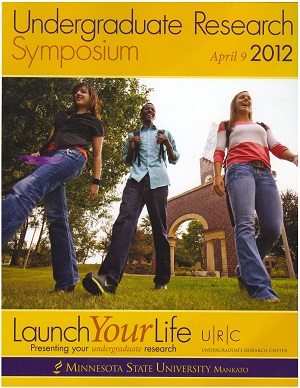Effects of an Increase in Nutritional Knowledge and Diet in Individuals with Developmental Disabilities
Location
CSU 202
Start Date
9-4-2012 11:00 AM
End Date
9-4-2012 12:00 PM
Student's Major
Social Work
Student's College
Social and Behavioral Sciences
Mentor's Name
Laura Strunk
Mentor's Department
Social Work
Mentor's College
Social and Behavioral Sciences
Description
Little is known about the effect of a healthy diet and an increase of nutritional knowledge as it pertains to individuals with developmental disabilities. Often times, the developmentally disabled population displays decreased levels of self-esteem, increased levels of depressive disorders, and overall rates of obesity. Data will be gathered from a target population of at least two individuals with developmental disabilities that are participants in an educational curriculum called "You Are What You Eat", operated out of SMILES Center for Independent Living in Mankato, MN. Data gathered during this study will consist of qualitative and quantitative methodologies through the use of observation, questionnaires, a pre-test/post-test, interviews, and participant self-reporting. Baseline data will be collected consisting of each participant\\\'s disability, their basic health regarding nutrition, their starting body weights, and their beginning results of a Patient Health Questionnaire (PHQ-9) that measures any possible existing depressive disorders. These same methodologies will be administered at the culmination of the study as well. Research data backing up the fact that a healthier diet and nutritional knowledge for developmentally disabled individuals can greatly improve their overall lifestyles can be provided to places like group homes, DT&H (Day Training & Habilitation) facilities and social service agencies to instill awareness to those places, as well as to the general public that this issue is often unnoticed, unaddressed, and is becoming increasingly problematic for the health of this demographic.
Effects of an Increase in Nutritional Knowledge and Diet in Individuals with Developmental Disabilities
CSU 202
Little is known about the effect of a healthy diet and an increase of nutritional knowledge as it pertains to individuals with developmental disabilities. Often times, the developmentally disabled population displays decreased levels of self-esteem, increased levels of depressive disorders, and overall rates of obesity. Data will be gathered from a target population of at least two individuals with developmental disabilities that are participants in an educational curriculum called "You Are What You Eat", operated out of SMILES Center for Independent Living in Mankato, MN. Data gathered during this study will consist of qualitative and quantitative methodologies through the use of observation, questionnaires, a pre-test/post-test, interviews, and participant self-reporting. Baseline data will be collected consisting of each participant\\\'s disability, their basic health regarding nutrition, their starting body weights, and their beginning results of a Patient Health Questionnaire (PHQ-9) that measures any possible existing depressive disorders. These same methodologies will be administered at the culmination of the study as well. Research data backing up the fact that a healthier diet and nutritional knowledge for developmentally disabled individuals can greatly improve their overall lifestyles can be provided to places like group homes, DT&H (Day Training & Habilitation) facilities and social service agencies to instill awareness to those places, as well as to the general public that this issue is often unnoticed, unaddressed, and is becoming increasingly problematic for the health of this demographic.
Recommended Citation
Sobota, Dylan. "Effects of an Increase in Nutritional Knowledge and Diet in Individuals with Developmental Disabilities." Undergraduate Research Symposium, Mankato, MN, April 9, 2012.
https://cornerstone.lib.mnsu.edu/urs/2012/oral-session-07/3




